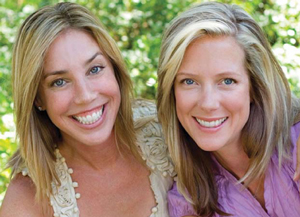It takes most moms 22 minutes before they start really telling the truth, according to coauthors Trisha Ashworth and Amy Nobile. “At first, the moms we interviewed would say, ‘Everything is great. I love my husband. I am so blessed,’” says Nobile, recalling the process of gathering material for the book I Was a Really Good Mom Before I Had Kids. “After 22 minutes moms finally gave themselves permission to open up and then it became, ‘I haven’t taken a shower in days. It’s so much harder than I thought it would be. I don’t know who I am anymore.’ ”
Ashworth and Nobile met 12 years ago in New York and became fast friends. Some years later they both moved to Marin—Nobile lives in Kentfield, Ashworth in Ross—and started families. Here, their paths diverged. Ashworth, who’d created advertising for companies like Pepsi, Levi Strauss and American Express, decided to stay home after she had her first child. “I put a lot of pressure on myself to be perfect,” she says. “I had in my head what a stay-at-home mom was, and it was very hard to live up to that.” When Nobile, a PR specialist who had worked with Visa and Jamba Juice, had her first baby a few years later, she decided to keep working: “I had this rosy vision about opening my own office and working while the baby napped. I tried as hard as I could to make that vision work, and it was just so difficult.”
From these cracks in their respective idealized views of motherhood, a new intimacy was born. “We really started to talk about our situations honestly and it eased the pain and made it more bearable, and I started to enjoy parenting a little more,” Ashworth says. They were on to something. “When no one is talking,” says Nobile, “you are building up a lot of guilt and issues. The pressure grew to the point where finally Trish and I sat together and said, ‘What is going on? We do so much; why do we feel like bad moms so much of the time?’”
The answer, they discovered, had a lot to do with having choices. “We grew up with the notion that we could do it all and that we should do it all,” Ashworth points out. “It raises the bar to an impossible ideal.”
Still, everyone else seemed to be doing so much better. Was it possible that other women were conflicted and overwhelmed, that maybe all the other moms weren’t walking around feeling blessed every second? They decided to find out.
“We began by thinking that maybe it was just in our area here,” says Nobile. “But when we interviewed women around the country, we found the same thing. Whether it was in Minnesota or Marin, one kid or five, the issue was overblown expectations.”

Enter I Was a Really Good Mom Before I Had Kids: Rewriting the Rulebook for Modern Motherhood, a book that reads like your fantasy moms’ group, the kind where every member is honest and funny and agrees that 1 p.m. is a perfectly reasonable time of day to drink wine. The book includes sections called “Dirty Little Secrets” where moms admit the kinds of things that would make Dr. Laura apoplectic, such as “I would trade my husband for a housecleaner” and “I let my six-year-old watch Access Hollywood with me.”
With excerpts from interviews, step-by-step charts, quizzes and tales from the trenches, the book acknowledges common (but sometimes shameful) frustrations and sheds light on the ways that having so many choices causes mothers to constantly second-guess themselves.
Despite its chatty tone and funny tidbits, the book has a more serious goal: to help moms rid themselves of some self-inflicted pressures and start enjoying motherhood. As the introduction says, “The goal of this book became very clear: to learn to love motherhood as much as we love our kids.”
Book Signing
Authors Trisha Ashworth and Amy Nobile will be present for a book reading and signing at Borders in San Rafael, Saturday, may 12 at 2 p.m.
Local Type
Rightsizing Your Life: Simplifying Your Surroundings While Keeping What Matters Most by Ciji Ware (Springboard Press, $16)
A practical, down-to-earth guide to rightsizing—the buzzword for streamlining your possessions and making time for the things that matter most in middle age. This simplification of surroundings and stuff aims to liberate people in midlife to pursue their passions and hobbies without the responsibilities of a big house weighing them down. Sausalito writer Ciji Ware presents a practical guide to this winnowing process, with a six-step plan for getting started.
Women Who Win: Women Athletes on Being the Best by Lisa Taggart (Seal Press, $15)
Through in-depth, revealing profiles of top female athletes—from surfer Jamilah Star to Olympic marathoner Deena Kastor to top-ranked climber Lynn Hill—Marin native Lisa Taggart takes us behind the scenes, deep into the training regimens and the ultimate victories, to see what makes these women tick. Whether their sport is soccer, cycling, mountain biking or volleyball, their stories will inspire you to pursue your dreams, athletic and otherwise.
Booksellers Recommend: Their Favorite Escape Reads
The Places in Between by Rory Stewart
“It’s nonfiction. Here is this Westerner who is literally on foot by himself, walking through Afghanistan, where ‘in many houses the only piece of foreign technology was a Kalashnikov and the only global brand was Islam.’ There is something about walking across a landscape that offers a depth of experience. I found it fascinating. I thought his writing was beautiful as well.”
—Dorothy Vandersteel,
Book Passage, Corte Madera
An American Childhood by Annie Dillard
“It’s a warm, funny family memoir from simpler times. It’s been a long time since I read it, but it still holds a special place on my bookshelf even now. Nobody writes memoirs about happy childhoods anymore; this is about a happy childhood and it’s funny.”
—Pete Mulvihill,
Green Apple Books, San Francisco
Shibumi: A Novel by Trevanian
“It’s a suspense thriller with a lot more class than most of them. It’s a World War I spy genre book that lets you escape your everyday reality. This one in particular is well written and has some deeper intellectual themes and more conscious characters. Often it’s so good guy/bad guy, but these characters have a lot
more depth.”
—Gary Kleiman,
Book Beat, Fairfax


